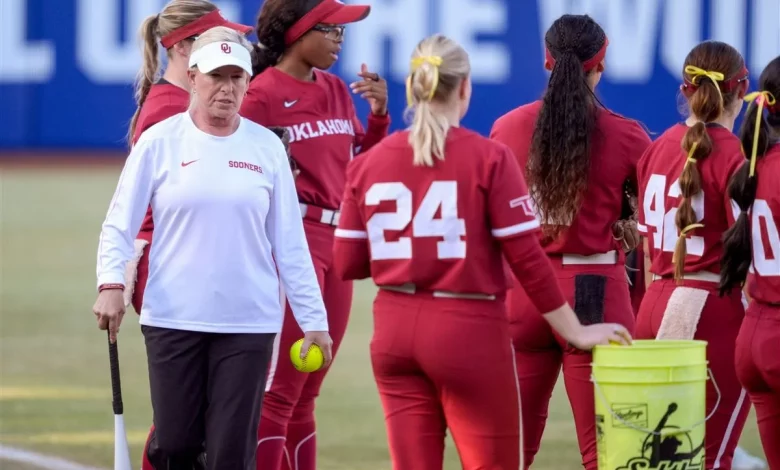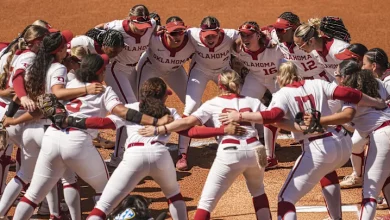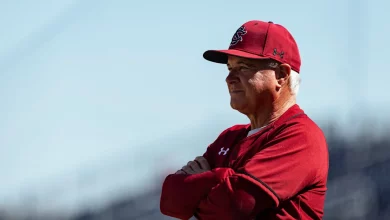I Don’t Blame Them”: Patty Gasso Backs Boston’s Frustration Over Norman Regional Snub.

Patty Gasso is no stranger to the bright lights and high stakes of NCAA softball, but even the legendary Oklahoma coach can empathize when another program feels shortchanged by the system. Following the NCAA Tournament selection, which placed Boston University in the Norman Regional alongside powerhouse Oklahoma, Gasso didn’t dodge the elephant in the room.
“I don’t blame them,” Gasso said, acknowledging the frustration voiced by BU head coach Ashley Waters. “They had a great season. I get where they’re coming from.”
For Waters and her Terriers squad, the selection felt less like a reward and more like a setup. Boston entered the tournament after dominating the Patriot League, finishing the regular season 52-4 and boasting one of the top team ERAs in the country. Yet, rather than being placed in a more geographically or competitively balanced regional, they were sent straight into the lion’s den: Norman, Oklahoma — home to the four-time defending national champions.
A Harsh Draw for a Hot Team
Boston’s regular-season resume was strong. The Terriers rolled through conference play and notched multiple wins over teams from power conferences. Their pitching staff ranked among the nation’s best in ERA, and their defense was elite. Still, when the brackets were revealed, they were matched up with the No. 2 overall seed Oklahoma — a perennial juggernaut that’s practically unbeatable at home.
Waters didn’t hold back in her post-selection comments, calling the placement “disheartening” and questioning the fairness of the regional allocations.
“Our kids have done everything right,” Waters said. “To have them face the top program in the sport right away — it’s tough to justify.”
Gasso’s Measured Response
Gasso, known for her competitive spirit and championship pedigree, could’ve taken a defensive stance. Instead, she showed understanding and empathy — rare in a sport where every advantage counts.
“They’re right to feel frustrated,” she said. “This system sometimes doesn’t reflect the full body of work a team has done. We’ve seen that before with other teams, too.”
Her response wasn’t just sportsmanlike — it was genuine. Gasso has long been an advocate for growing the game and elevating under-recognized programs. She knows that having strong, well-supported opposition helps the sport thrive.
Why the Norman Regional Draws Scrutiny
The Norman Regional has long been seen as a proving ground — or a punishment — depending on perspective. With Oklahoma’s dominant record and fervent home crowd, teams sent there rarely emerge unscathed. For mid-majors like Boston, it can feel like being sent to the guillotine.
The NCAA softball tournament’s selection process is based on various metrics: RPI, strength of schedule, and conference championships among them. But critics argue that those metrics often disadvantage mid-major teams, whose schedules don’t include the same level of Power Five competition, even when their win-loss record is superior.
In 2024, Boston’s situation mirrored that of other strong mid-majors who’ve been sent to blueblood programs early — Florida Gulf Coast, James Madison in earlier years, and even Liberty. For programs trying to take the next step, drawing a regional at a top-seeded powerhouse can feel like a ceiling, not an opportunity.
Boston’s Case for a Better Draw
Statistically, Boston had a compelling case for a higher seed and more favorable location. Their 52 wins were among the most in Division I softball. They had a top-5 ERA, a fielding percentage above .980, and a lineup that could produce timely offense.
Waters advocated fiercely for her players, stating: “We don’t fear competition, but when you work all year to build something, you want to be given a chance to compete — not survive.”
Some analysts agreed. Former players and broadcasters took to social media to question the committee’s logic. ESPN analyst Amanda Scarborough tweeted: “Boston deserved better. They’re not just a good mid-major — they’re a good team, period.”
The Gasso Effect
For Gasso to acknowledge Boston’s frustration carries weight. Her words resonate because of her credibility. Oklahoma has won seven national titles under her watch, and she’s regarded as one of the sport’s most influential voices.
By publicly validating Boston’s disappointment, Gasso is not just being diplomatic. She’s reinforcing the broader need for reform in how the NCAA approaches seeding and regional placement.
“You want the tournament to be about great matchups and growing the game,” Gasso said. “I think there’s still room to improve how we do that.”
Looking Ahead: What Changes Could Help?
The NCAA softball tournament has expanded in popularity and visibility, but its structure hasn’t kept pace. Critics suggest that the current regional system, which heavily emphasizes geography, often punishes Eastern and Northern teams who have to travel west to face dominant programs.
Revising the RPI formula, reducing emphasis on geography, and rewarding conference champions more meaningfully are among the changes proposed by coaches and analysts. Waters, for her part, wants consistency and transparency.
“If we knew what the real criteria were, we’d build our schedule accordingly,” she said. “But when it feels arbitrary, it’s frustrating.”
Boston’s Response: Fight Anyway
Despite the uphill battle, Boston isn’t folding. Waters has turned the perceived snub into a rallying cry for her team. They’re using the matchup as motivation, knowing that upsetting Oklahoma would send a resounding message.
“We’re not going in to just compete,” said senior pitcher Allison Boaz. “We’re going in to win. We believe in ourselves.”
Respect Earned, Not Just Given
Gasso, who knows what it takes to win it all, respects that attitude. That’s why she didn’t dismiss Boston’s anger or frustration. She understands the chip on their shoulder — it’s the same one her program had when building its dynasty decades ago.
“Everyone wants their shot,” she said. “And when you’ve earned it, you want to feel like the system sees that. I completely get it.”
This isn’t just about one matchup in one regional. It’s about equity in the postseason. It’s about recognizing and rewarding excellence, even when it comes from outside the traditional power conferences. And it’s about leaders like Patty Gasso being willing to stand with their competitors when the system gets it wrong.
For Boston, the road through Norman may be steep, but with their coach in their corner and respect from a legend like Gasso, they won’t walk it alone.









